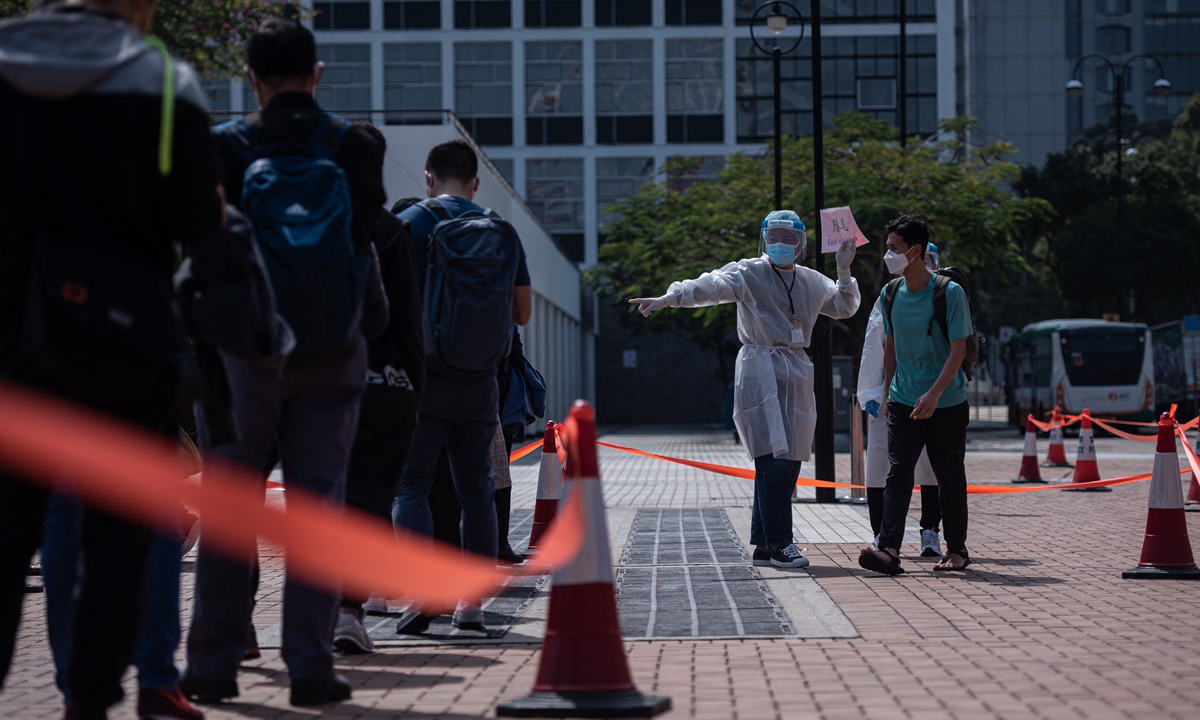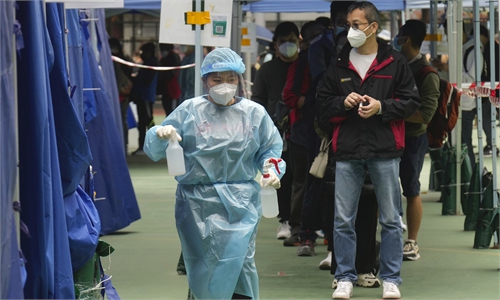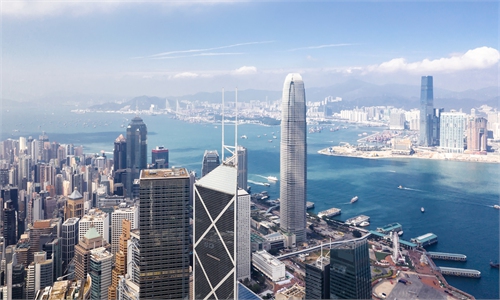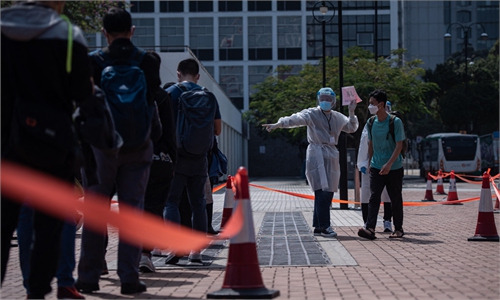
People line up for COVID-19 testing in Hong Kong on February 12, 2022, as city authorities scrambled to ramp up testing capacity following a record high of new infections. Photo: AFP
To weather the surge in cases and realize border opening with the Chinese mainland as soon as possible, Hong Kong must be determined to stick to the dynamic "zero-COVID" strategy and resort to stricter measures to stamp out the coronavirus infection to inject much-needed confidence in the city to keep the virus at bay, top mainland epidemiologists said.
The zero-COVID policy is the only and correct way out for Hong Kong, experts said in response to certain doubts of the approach within the city. They believe truly sticking to the policy is not only a matter of ensuring public health in Hong Kong but also a serious political test for the city's COVID-19 fight.
Hong Kong reported 1,619 new cases on Tuesday, raising the city's confirmed cases to 5,400 since the start of the new wave. John Lee Ka-chiu, Chief Secretary for Administration of the HKSAR government and Regina Ip Lau Suk-yee, a member of the Executive Council and lawmaker in Hong Kong, are under home quarantine after their close contacts tested positive for COVID-19, local media reported on Tuesday.
At a Tuesday press conference, Carrie Lam, chief executive of Hong Kong, admitted that the virus has spread fast within residential communities over the past week, and the city's capacity to handle it failed to live up to optimal levels.
Lam stressed the Hong Kong government will stick to the dynamic zero-COVID goal as surrendering to COVID is not an option and the city will deal with challenges with a positive attitude.
While dismissing plans of large scale seal-off of the city, Lam discussed the government's latest COVID-19 measures, which include increasing isolation facilities, and test frequency of nursery work staff.
If Hong Kong does not impose a large-scale seal-off, it should at least step up its current COVID-19 measures and make sure those measures are fully implemented. This way, the city can weather this surge in a short time, Zeng Guang, former chief epidemiologist of the Chinese Center for Disease Control and Prevention (CDC), told the Global Times. He suggested the city first install makeshift hospitals to relieve the pressure from public hospitals and isolation points.
He is also confident that this wave will be put under control with the help from the mainland.
To tackle the growing health crisis, Hong Kong will set up five joint task forces with neighboring Guangdong province, John Lee said on Saturday. They would focus on boosting Hong Kong's ability to carry out testing and pathological examinations, constructing quarantine facilities and maintaining a steady supply of medical goods, he said. Lee also said he would oversee the anti-pandemic work with mainland counterparts.
Sealing off the residential compounds in Hong Kong is not enough, and only massive citywide tests will be able to detect the hidden transmission chains, find the sources and put this wave under control, Tong Kai Sing, vice president of the Association of Licentiates of Medical Council of Hong Kong, a professional medical organization established in 1995 in Hong Kong, told the Global Times.
Yes, you can
Since facing the new onslaught of COVID-19, there are also debates in Hong Kong on whether the city should discard the current COVID-19 policy and "co-exist" with the coronavirus.
Former LegCo president Jasper Tsang Yok-sing was among the latest to say that Hong Kong needs "its own road to fight coronavirus." He believes the price of zero-COVID is too high for Hong Kong to pay, and doubts Hong Kong's ability to achieve such an ambitious goal.
Yet another senior CDC official, who declined to be named, told the Global Times that sticking to the dynamic zero-COVID policy is the only way out for Hong Kong now. He cited the city's strained medical resources as example, warning it would crash if a large number of cases set in.
Another reason is that Hong Kong heavily relies on the mainland if it wants to open the border with the Chinese mainland, as the city has been repeatedly trying. It must achieve the "same level of pandemic control as the mainland," said the CDC official, noting a border opening should be a strong impetus for Hong Kong to stick to zero-COVID.
Lam said on Tuesday that the local government will recruit more cross-boundary truck drivers as well as transporting goods from the Chinese mainland to Hong Kong via water, China Media Group (CMG) reported.
The Chinese mainland has increased the supply of goods to Hong Kong. South China's Guangdong Province is an important supplier of food to the SAR, and the province has continued to ensure the safe and stable supply of various products to Hong Kong, such as vegetables and chilled meat, the CMG reported on Monday.
The new surge was caused by the city's swing between strict control measures and Western-style relaxed measures. It has never fully achieved zero-COVID. The hesitation delayed Hong Kong's golden chance to clear cases, Tian Feilong, an associate professor at Beihang University's law faculty and a member of the Chinese Association of Hong Kong and Macao Studies, told the Global Times.
He believes that realizing a border opening with the mainland is the biggest political test for Hong Kong's anti-pandemic policies, and it's the only right way out for the city. Only in this way can Hong Kong follow the whole country's pace of development and not be left out of the development of the Guangdong-Hong Kong-Macao Greater Bay Area.
Epidemiologists admitted that Hong Kong faces many challenges to achieve zero-COVID, such as the local government's lack of ability to mobilize resources, a high population density, prevailing individualism, objections from a small group of people, and politicization of the zero-COVID policy.
Yet they are also confident that Hong Kong can straddle those hurdles and put the outbreak under control.
"The situation in Hong Kong is way better than that of Wuhan two years ago, where people had little knowledge of the virus, zero immune system and witnessed many severe cases and deaths because of the coronavirus," said Zeng.
Yet Wuhan has managed to keep virus at bay within a short period of time. With more determination, Hong Kong can also achieve zero-COVID, he said.



